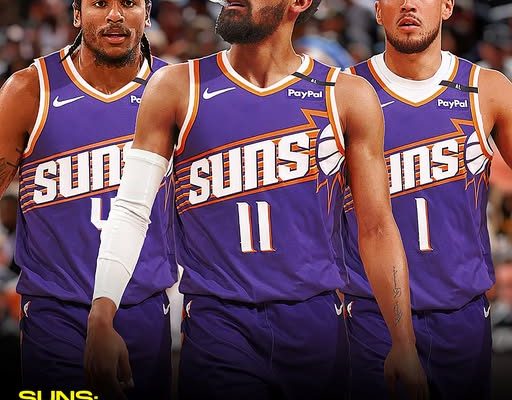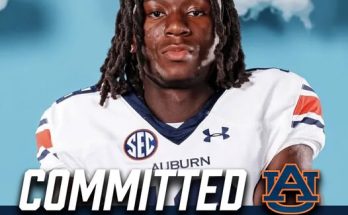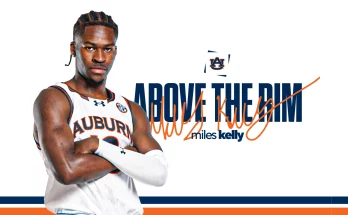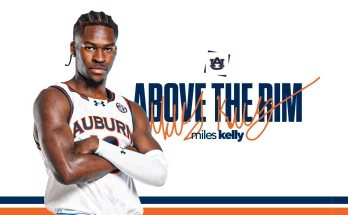The Phoenix Suns have never been shy about making bold moves to stay competitive, and the latest buzz surrounding the possibility of acquiring Trae Young from the Atlanta Hawks is generating a new wave of intrigue. For a franchise that has been on the cusp of greatness but has struggled to sustain momentum in the brutal Western Conference, this potential blockbuster is more than just a trade rumor—it could be the pivot point that reshapes the Suns’ identity and championship aspirations. The idea is simple yet tantalizing: pair one of the NBA’s most dynamic playmakers with an already loaded roster featuring Devin Booker, Jalen Green, Dillon Brooks, and Mark Williams. The vision is clear, and the potential is immense.
Bringing Trae Young into the fold would instantly transform the Suns’ offensive architecture. His ability to orchestrate the game as a high-volume passer and elite scorer would free Booker from the heavy ball-handling duties he often shoulders. Booker, already one of the league’s premier shot creators, would benefit immensely from having more opportunities to attack defenses off the ball, where he can exploit mismatches and utilize his precision footwork and deadly midrange game without always initiating the offense. Trae thrives in creating space—whether it’s through his deep three-point shooting that forces defenses to extend beyond their comfort zone or his masterful use of the pick-and-roll to manipulate defenders into impossible decisions. With Booker lurking on the weak side, defenders would have to choose between helping to contain Young’s dribble penetration or sticking tight to one of the NBA’s most efficient scorers.
The addition of Jalen Green adds another dimension to this fantasy scenario. Green’s athleticism and slashing ability are already problematic for defenders, but in a system run by Young, his impact could skyrocket. Trae’s court vision would make Green a constant threat cutting to the rim, capitalizing on backdoor opportunities and broken defensive rotations. While Green has shown improvement as a spot-up shooter, his explosiveness in attacking closeouts might become his greatest weapon in a Suns offense that spaces the floor and keeps defenders scrambling.
Defensively, the pairing of Trae and Booker will always be a concern on paper, but that’s where Dillon Brooks becomes indispensable. Known for his tenacity, versatility, and willingness to guard the opposing team’s top scorer, Brooks would provide the defensive backbone this lineup needs. His ability to take on the toughest perimeter assignments would allow the Suns to hide Young on less threatening offensive players while still maintaining a strong overall defensive presence. Brooks’ energy and edge are exactly the kind of ingredients that championship teams lean on in the playoffs, especially in the Western Conference where every possession is contested at an elite level.
Anchoring the defense and providing stability in the paint would be Mark Williams. His role in this system would go beyond just being a rim protector. Williams’ size, timing, and ability to finish lobs make him an ideal pick-and-roll partner for Trae Young. Young has made a career out of elevating big men in the pick-and-roll, and Williams’ skill set aligns perfectly with that strength. His screens would create the space Trae needs to navigate the halfcourt while his vertical threat at the rim would constantly keep defenses honest. Offensively, he could become one of Young’s most reliable options, while defensively, he would cover for breakdowns and deter opponents from attacking the basket freely.
The fit looks beautiful on paper, but the reality of executing such a trade is complex. The Suns have already sacrificed much of their draft capital in previous moves, meaning a deal for Trae Young would almost certainly require parting with the remainder of their future picks, along with possible player assets. This is not a move for the faint of heart—it’s the kind of decision that defines a franchise for years. But for Phoenix, the calculus might be straightforward: with Kevin Durant’s timeline narrowing and Booker entering the heart of his prime, the time to win is now.
A backcourt of Trae Young and Devin Booker would immediately become one of the most feared scoring tandems in the league. The shooting gravity, playmaking creativity, and offensive firepower they’d bring would put immense pressure on opposing defenses. Against Western Conference powerhouses like the Denver Nuggets, Golden State Warriors, and Dallas Mavericks, the Suns could match or even exceed the offensive punch those teams bring. The challenge, as always, would be maintaining defensive discipline and ensuring that the role players buy into a team-first mentality, something Brooks and Williams would help enforce.
There’s also the matter of chemistry and leadership. Trae Young has faced criticism in the past for clashes with coaches and teammates in Atlanta, and integrating him into a team with established stars like Booker and Durant (assuming KD is still in Phoenix) would require strong communication and a shared commitment to winning. However, the potential upside of unlocking a fully engaged Young in a competitive, well-structured environment could outweigh the risks. Playing alongside veterans who have experienced deep playoff runs might bring out the best in his game, allowing him to focus on his strengths while improving in areas that have drawn scrutiny.
Offensively, the possibilities are endless. The Suns could run double drag screens with Williams and Brooks setting the stage for Trae to either pull up from deep, find Booker curling to the midrange, or hit Green on a cut. They could stagger minutes so that Young leads the second unit, ensuring the offense never stalls. They could even explore more transition-heavy sets, as Young’s ability to push the pace and find trailing shooters or lob threats could add a new gear to their attack.
Defensively, while no one expects Trae to suddenly become a lockdown stopper, the system could be designed to minimize his weaknesses. With Brooks as the perimeter enforcer and Williams as the paint protector, the Suns could employ more aggressive switching or zone looks to funnel action away from Young. The key would be balancing their high-octane offense with just enough defense to compete with the elite teams in the conference.
The Western Conference landscape is always shifting, and the Suns know that standing still is the quickest way to get left behind. The rise of young stars, the consistency of veteran teams, and the unpredictability of injuries mean that windows to win championships can close abruptly. Trading for Trae Young would be a gamble, but one that aligns perfectly with Phoenix’s recent history of making aggressive moves to stay relevant at the highest level.
If this vision becomes reality, the Suns wouldn’t just be adding a player—they’d be creating a basketball ecosystem tailored for offensive dominance. Trae Young’s passing would unlock Devin Booker’s scoring in new ways. Jalen Green would thrive as a secondary scorer and athletic finisher. Dillon Brooks would handle the defensive grunt work and keep the team’s competitive spirit alive. Mark Williams would be the defensive anchor and lob-finisher who thrives off Young’s creativity.
It’s the kind of move that would send shockwaves through the league, not just because of the names involved, but because of the statement it would make: the Phoenix Suns are not here to rebuild or tread water—they are here to win, and they are willing to stake their future to make it happen. If they can pull it off, the rest of the West will have no choice but to take notice, because with Trae Young orchestrating, Devin Booker firing, and a supporting cast built for both ends of the floor, the Suns might just solidify themselves as a true powerhouse again. And in a conference where margins are razor thin, that might be the exact edge they need to chase the ultimate prize.



